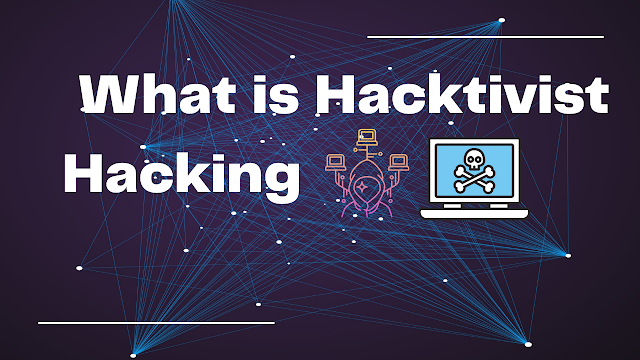The term "hacktivism" describes the
use of technology and hacking methods to advance a social or political cause.
Hacktivists are people or organizations that employ hacking to further a
particular cause, such as environmental protection, civil rights, or freedom of
speech. While some hacktivists adhere to the law, some do things that are
against the law, which can have major repercussions.
Types
of Hacktivism:
Leaks
of Information:
Whistleblowing: Hacktivists may divulge
sensitive or secret material to reveal government or business wrongdoing.
WikiLeaks, which revealed confidential information pertaining to many countries
and organizations, is a significant example.
Data dumps: To draw attention to a number of
concerns, organizations like Anonymous have released data dumps containing
private information, including emails and contact information.
Website
vandalism:
Websites may be targeted by hackers who add
statements or graphics supporting their cause in place of the original
material. This is a type of cyber-protest or cyber-vandalism.
Distributed
Denial of Service (DDoS) Attacks:
DDoS attacks entail flooding a target website
or service with traffic in order to briefly make it unreachable. DDoS attacks
have been utilized by Anonymous in the past to protest against particular
institutions.
Social
media advocacy:
To spread awareness of social or political
issues, hacktivists may develop or spread hashtags, memes, or online campaigns.
To promote their messages, they can potentially hack into social media
accounts.
Bombing
emails:
To stymie communication, hacktivists may flood
email accounts with a huge amount of messages. This may be done as a form of
protest or to bring attention to a problem.
Cyberattacks
and malware:
Some hacktivist organizations may deploy
malware or launch cyberattacks to interfere with or harm their targets'
systems. An example of a cyberattack with political ramifications is Stuxnet, a
computer worm thought to have been created by nation-states.
Transparency
Hacking:
By breaking into the systems of organizations
or governments, some hacktivists want to expose corruption or unethical
behavior.
Internet
censorship avoidance:
To get around internet censorship and access
restricted material, hackers may create tools and methods. Examples of such
initiatives include the Tor network and circumvention tools like Psiphon.
Privacy
Advocacy:
Some hacktivists concentrate on defending personal
privacy and pushing for robust encryption and online security.
It's critical to remember that
hacktivism is a contentious activity. Others consider it to be unlawful and
dangerous, while some regard it as a way to fight injustice. Legal repercussions
for hacktivism can be serious and include jail time and high fines.
Hacktivism has developed recently as
a result of the widespread use of the internet by organizations and people to
spread awareness of a variety of social and political issues. Hacktivism's
efficacy and moral implications are still up for discussion.





1 Comments
Wow
ReplyDelete